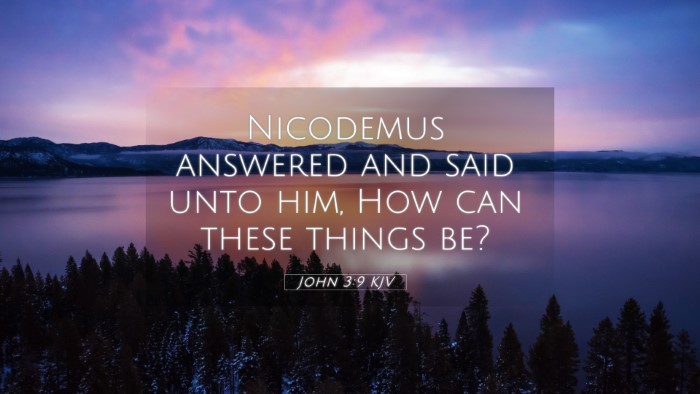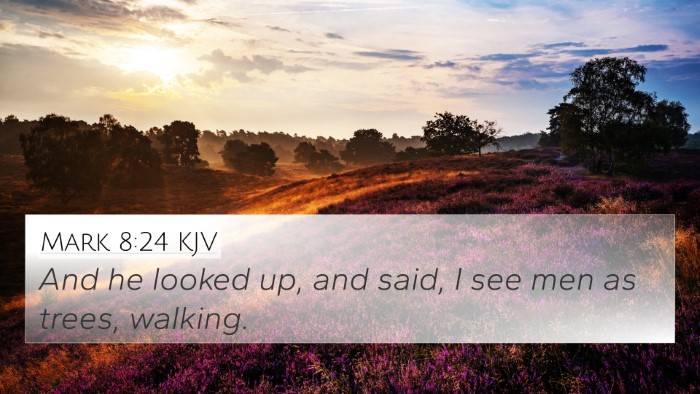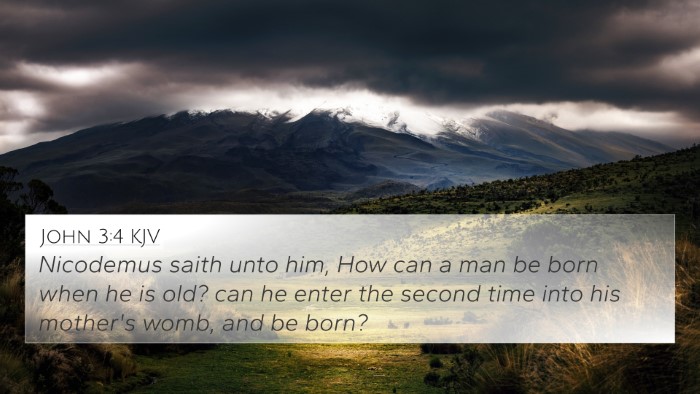Understanding John 3:9
In John 3:9, we observe the conversation between Nicodemus and Jesus, where Nicodemus expresses confusion regarding the concepts of being born again and spiritual rebirth. This verse states:
"Nicodemus answered and said unto him, How can these things be?"
This question encapsulates the struggle to comprehend profound spiritual truths that challenge human reasoning.
Meaning and Interpretation
The inquiry by Nicodemus offers a rich ground for theological reflection. Drawing insights from various public domain commentaries, we can explore the multiple layers of meaning behind this verse:
Matthew Henry's Commentary
Human Limitations: Henry emphasizes that Nicodemus represents those who approach spiritual matters with human reasoning. The perplexity here highlights the limitations of the flesh in understanding spiritual rebirth.
Albert Barnes' Notes
Need for Revelation: Barnes points out that understanding spiritual rebirth requires divine revelation. Nicodemus's confusion serves as an illustration of how the natural man cannot grasp spiritual truths without the Holy Spirit's assistance.
Adam Clarke's Commentary
Faith and Inquiry: Clarke suggests that Nicodemus's honest inquiry reflects a sincere desire to understand deeper spiritual truths. This interaction underscores the importance of questioning and seeking understanding in the faith journey.
Cross-References for Deeper Exploration
John 3:9 is intricately connected to several key Bible verses that further illuminate its meaning:
- John 3:3: "Jesus answered and said unto him, Verily, verily, I say unto thee, Except a man be born again, he cannot see the kingdom of God."
- 1 Corinthians 2:14: "But the natural man receives not the things of the Spirit of God: for they are foolishness unto him: neither can he know them, because they are spiritually discerned."
- Romans 8:7: "Because the carnal mind is enmity against God: for it is not subject to the law of God, neither indeed can be."
- Ephesians 2:1: "And you hath he quickened, who were dead in trespasses and sins."
- John 6:44: "No man can come to me, except the Father which hath sent me draw him: and I will raise him up at the last day."
- 1 Peter 1:23: "Being born again, not of corruptible seed, but of incorruptible, by the word of God, which liveth and abideth for ever."
- Titus 3:5: "Not by works of righteousness which we have done, but according to his mercy he saved us, by the washing of regeneration, and renewing of the Holy Ghost."
Connections Between Themes
This verse invites a comprehensive thematic analysis connecting various scriptures:
- The Role of Faith: John 3:9 illustrates the need for faith when approaching God’s truths, akin to Romans 10:17, which teaches that faith comes by hearing the word of God.
- The Importance of Spiritual Rebirth: The concept of being born again connects with 2 Corinthians 5:17, stating that anyone in Christ is a new creation.
- Supernatural Understanding: John 14:26 speaks to the role of the Holy Spirit as a teacher, which resonates with Nicodemus’s confusion and the need for heavenly insight.
Tools for Bible Cross-Referencing
To deepen your study related to John 3:9 and similar verses, consider utilizing various Bible reference resources and tools:
- Bible Concordance: Helps in finding keywords and themes across scriptures.
- Bible Cross-reference Guide: A systematic approach to identifying connections between verses.
- Cross-referencing Bible Study Methods: Engaging in thematic studies to understand scripture in context.
Conclusion
John 3:9 serves as a poignant reminder of the need for divine revelation in comprehending the mysteries of faith. Through the responses and insights of Nicodemus and Jesus, the dialogue illustrates a spiritual awakening that resonates across the biblical narrative. Cross-referencing this verse with others enhances our understanding of rebirth, faith, and spiritual transformation, inviting a richer engagement with the scriptures.
Related Keywords for Further Study:
- Bible verses that relate to John 3:9
- How to find cross-references in the Bible
- Identifying connections between Old and New Testament
- Cross-referencing Psalms with New Testament teachings









